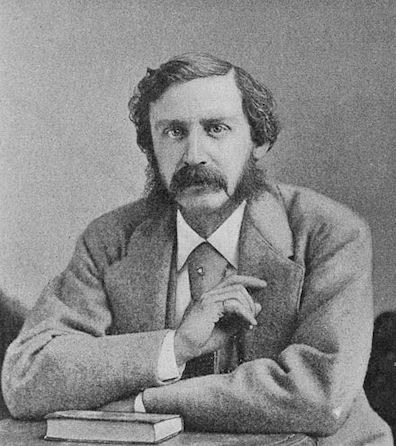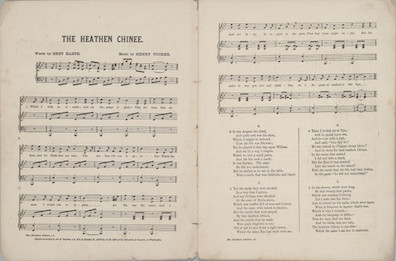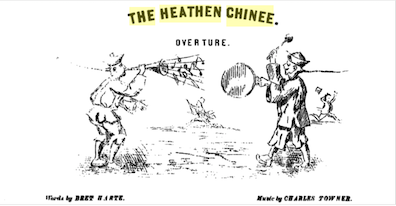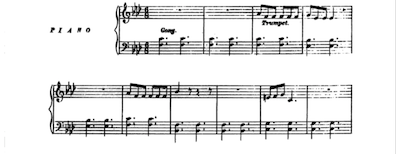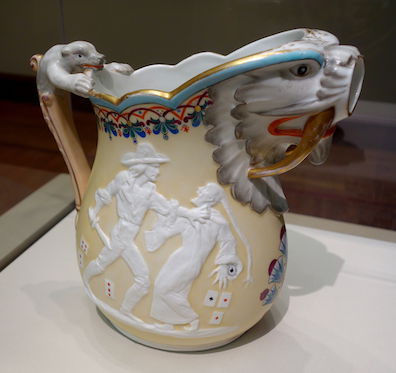In 1870, while living in northern California, Bret Harte
published a narrative poem titled Plain Language from
Truthful James that sought to undermine the racial
prejudice shown toward Chinese workers in the western U.S.
Quickly gaining fame, the poem was republished at least eight
times in east-coast journals under the title The Heathen
Chinee.
The poem begins with the eponymous James struggling in his
rough-hewn and not very intelligent way to "explain" in
"plain" language what is so "peculiar" about the Chinese:
Which I wish to remark,
And my language is plain,
That for ways that are dark
And for tricks that are vain,
The heathen Chinee is peculiar,
Which the same I would rise to explain.
The speaker proceeds to tell how he and his friend Bill Nye sat
down to a game of euchre with a Chinese man. Ah Sin's smile was
"childlike and bland," and the whites assumed that "He did not
understand" the game, so they expected to easily take his money,
especially as Bill's sleeve was "stuffed full of aces and
bowers, / And the same with intent to deceive." But Ah Sin
shocked them by playing quite well, and at last "he put down a
right bower, / Which the same Nye had dealt unto me." At this
clear evidence of cheating Bill exchanges glances with James and
attacks the treacherous Chinaman. When the brawl is over the
floor is littered with cards Ah Sin had been hiding, and an
additional "twenty-four packs" are found in his long sleeves.
Harte intended for the poem to suggest that Chinese laborers
were smart enough to beat Americans at their own corrupt
games—he wrote later that Ah Sin "did as the Caucasian did
in all respects, and, being more patient and frugal, did it a
little better"—but he greatly underestimated the malice and
stupidity of his audience. He was dismayed when many American
readers drew the dim-witted conclusion that what makes the
heathen Chinee "peculiar" is his treacherous dishonesty.
Interpretations aside, the poem was wildly popular. It inspired
several anti-Chinese songs on the west coast, and Harte co-wrote
with Mark Twain a playscript titled
Ah Sin, which was
performed for several months in 1877.
In
Yellowface: Creating the Chinese in American Popular
Music and Performance, 1850s-1920s (2005), Krystyn Moon
writes that "three composers used Harte's
Heathen Chinee
as lyrics. Henry Tucker's
Heathen Chinee (1871) was
quite simple, with only three chords. F. Boote's and Charles
Towner's versions had completely different sonic qualities,
using both musical notation and instrumentation to denote
Chinese difference. Both were written in minor keys, G and F
minor respectively, which gave the lyrics a more ominous and
eerie sound. Boote's
Heathen Chinee (1870) even included
diminished chords and a little syncopation, similar to devices
found in Orientalist art music or blackface minstrelsy. Along
with adding his own words in the form of a chorus to affirm the
moral turpitude of Ah Sin, Towner, in his version of
Heathen
Chinee (1870), included orientalized sounds through the
use of repeated notes in the bass clef and a recommendation that
performers use a gong and a trumpet during the introduction"
(40).
It seems possible that one or more of these song versions
may have been performed on the British music hall stages that gave
Joyce so many of the songs of Ulysses. If any of the
songs did find its way onto such stages, its casual trading in
racial stereotypes would have been right at home in that
raucous low-brow atmosphere. Like the many depictions of black
people drawn from minstrel shows in Ulysses, the image
of a cunning Chinese card-sharp may arouse disgust in 21st
century readers, but circumstances were different in
1904. Bloom cannot be greatly faulted, when he sees an
announcement of a priestly mission to China, for calling up
his one familiar image of that utterly foreign people. And a
man who can assent good-naturedly to the characterization of
his own people as "Ikey" may be
forgiven for perpetuating the name "Chinee."

